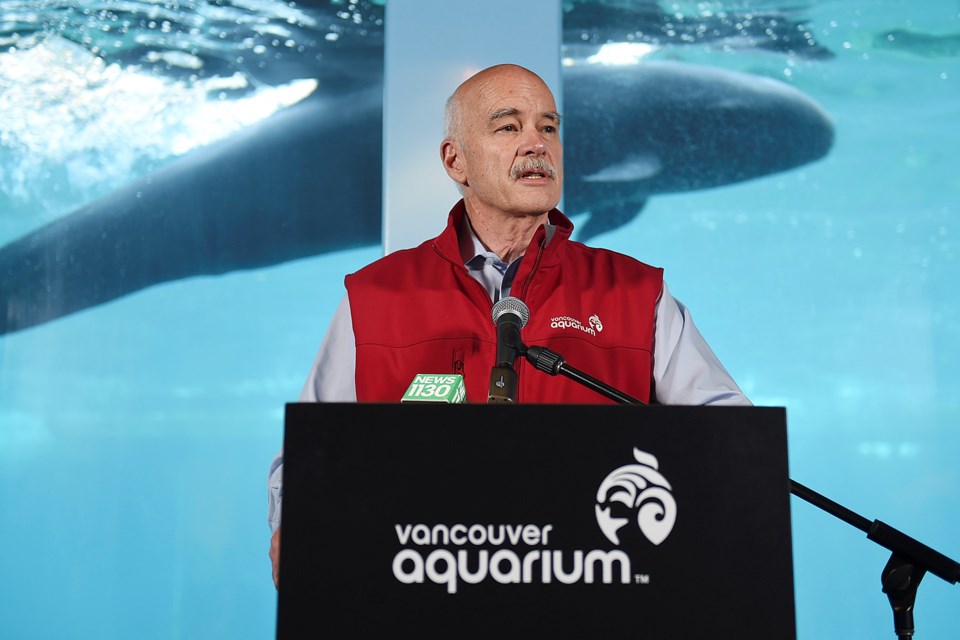The Vancouver park board set an “aggressive timeline” with its “short-sighted, rushed” decision to ban cetaceans at city parks, a move that will ultimately undermine the goal to protect marine mammals, said representatives of the Vancouver Aquarium, including the CEO, chief veterinarian and incoming chairman.
Speaking to reporters this morning in front of underwater windows that looked onto a tank where two rescue animals played, the CEO of the aquarium criticised the seven park board commissioners who unanimously voted March 10 to ban the display of whales and dolphins in Vancouver.
“We have been saving marine mammals like these for more than 50 years, in fact 57 years,” John Nightingale said of Chester, a false killer whale and Daisy, a harbour porpoise.
“The proposed bylaw raises serious questions --- without any answers --- regarding the future of Chester, Daisy, Helen [a white-sided dolphin], and any future rescued cetaceans that cannot return to the wild,” he said. “If there is a ban, there will be nowhere for sick and injured animals to go if they cannot be released.”
Nightingale is pleading with the park board to reconsider its decision.
As a counter-move to park board, which will consider staff recommendations about the specifics of a ban by May 15, Nightingale said the aquarium has launched its own public engagement offensive and asks that residents around the Lower Mainland to voice support for the marine centre based in Stanley Park and “help ensure the commissioners understand the tremendous concern” over the ban.
“Today we have launched a new attempt to have an informed and engaged conversation around the devastating consequences of this proposed bylaw,” he said.
Nightingale could not say what will happen to the existing cetaceans at the aquarium once a ban comes into effect. “We have had no word,” he said. “We have not seen a draft of the bylaw so we are completely in the dark.”
The aquarium, which counts roughly 500 staff and 1,200 volunteers among its ranks, has added new features and online content to its website and is asking the public around the Lower Mainland to contact the Vancouver park board.
Over nearly 60 years, the aquarium has rescued and rehabilitated 1,500 marine animals, the vast majority which were released to the wild. Of those hundreds of species, six were cetaceans and one of those was released back to the wild. The federal Department of Fisheries and Oceans determines if an animal is viable for release.
Martin Haulena, the chief veterinarian at the aquarium, said animals that live in captivity because they are not viable for release allow marine scientists to better help wild populations.
“Having Chester here gives us the opportunity to learn about cetaceans and gives us the opportunity to get better at what we do,” he said.
“It is very worrisome right now,” he added, his voice wavering slightly as he spoke of his passion for whales dolphins that was sparked as a child. “We are asking folks to take some time to learn about what we do.”
The incoming chairman of the board of directors at the aquarium, Randy Pratt, said the park board did not do enough to understand what was at stake.
"We have tried to work proactively with the park board commissioners to share accurate information and expert research. We have tried to address their concerns and identify a collaborative path forward. But unfortunately, our outreach has fallen on deaf ears."
Pratt implied the decision should go beyond the elected municipal body.
"Due to the park board's aggresive timeline, we simply can't leave this proposed ban and the dire consequences it has for the most vulnerable animals in the hands of seven park board commissioners," he said. "This is a decision that impacts us all."
The park board voted March 10 to ban the captivity of whales and dolphins at the Vancouver Aquarium but did not specify if or how that might apply to the rescue and rehabilitation of marine animals.
More than 60 people addressed commissioners and many more submitted written correspondence. The public gallery was raucous and partisan as factions of observers loudly clapped and cheered for the opinions they supported.
Among them were international marine biologists and scientists who spoke about changing Arctic environments and other threats to wild beluga populations; no beluga whales remain at the aquarium since two died last fall, however the aquarium does have five that live elsewhere on the continent.
At the meeting on March 10, which punctuated by vocal anti-captivity activists who shouted down Nightingale who left before the final decision, one commissioner said a plebiscite was not needed because public sentiment was clear. Approval of the aquarium has dropped because many Vancouverites disagree with keeping large mammals in "unnatural environments," said Vision commissioner Catherine Evans.
"...support is plummeting, frankly," she said at the time.
The board voted unanimously for the ban.
Park board staff will return with a report and recommendations by May 15.



